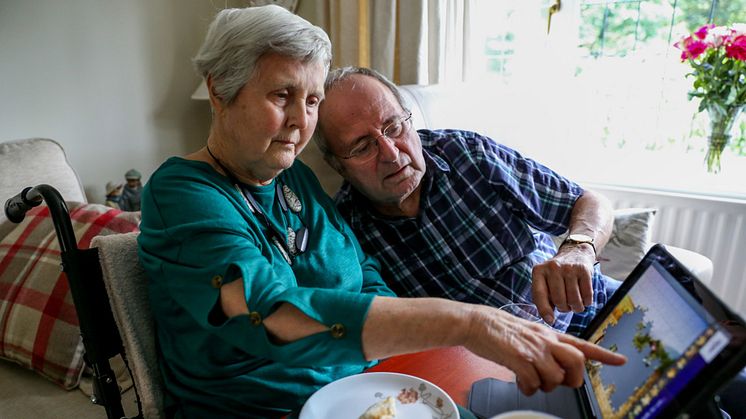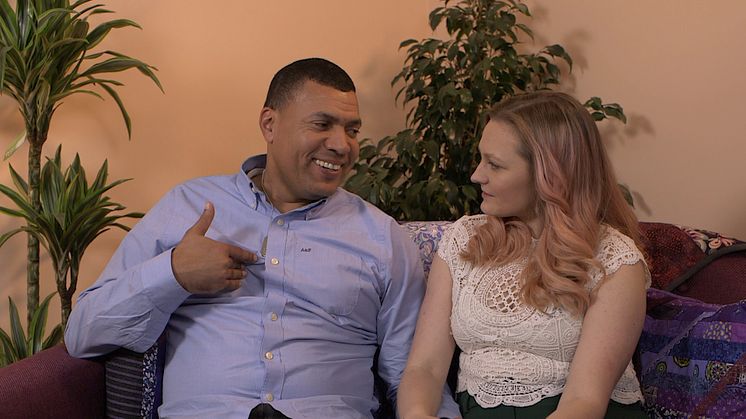
Press release -
Carers at breaking point: UK stroke carers go without vital support
One in five (19%) people caring for stroke survivors have not accessed any form of help after their lives were turned upside down overnight, according to new figures published today by the Stroke Association.
The charity has also found that 40% of stroke carers who had been caring for more than three years report feeling exhausted and around 1 in 3 stressed or anxious . Despite this, more than a third of people caring for stroke survivors (35%) receive no emotional support, with a devastating impact on their health and well-being.
There are currently over 1.2 million stroke survivors in the UK and this number is predicted to rise to 2.1 million in 2035. The charity is warning that stroke carers are coming under increasing pressure to manage their own daily needs while caring for their loved ones, and the situation is likely to get worse.
The Stroke Association’s Lived Experience report is the UK’s largest ever survey of people affected by stroke (i) with over 11,000 responses. The third chapter (of four), Caring for a stroke survivor: what carers need, reveals:
- Stroke carers are struggling to cope: almost half (47%) of the carers who did not have any support said that they were not offered any help, or did not know where to start.
- Stroke carers are feeling isolated: Over a quarter (27%) of carers said there were not enough support groups for them.
Stuart Atkin, 75 from Bradford, found his life turned upside down, as he went from husband to full time carer overnight. On New Year’s Day 2019, Stuart found Pam collapsed in the kitchen. She’d had a life changing stroke.
Pam spent a total of 50 days in hospital, initially in intensive care before being moved to the stroke ward at Bradford Royal Infirmary. Pam’s stroke left her with left hand sided weakness and affected her cognitively.
Eventually, the doctor and the Occupational Therapist agreed that Pam could go home, however, they advised Pam needed to have carers in place. A private company provided two carers four times a day and they also provided the necessary equipment; a hoist, wheelchair, hospital bed.

Once home, the reality of caring for Pam full time started to take its toll on Stuart. He said: “The carers came with a visit at around half an hour each time. In the meantime I had to cope. Nobody talked to me and explained what being a full time carer involved. Organising all the medication, clothing, toileting, nurses visiting – it all just happened. The first week when the physiotherapists came, I mentioned getting her walking again; they looked at me and said she’ll never walk again. It was such a blow; it shattered me.
“For the next four weeks, everything went wrong. District nurses were getting mixed up and bringing equipment Pam didn’t need. Medication was being provided, but when it arrived, it wasn’t right. It was a nightmare. As a former architect and company director, I’ve always been in charge, but this was out of my control. It was getting me down, I felt stressed and couldn’t sleep. I couldn’t perform simple tasks, I was so overwhelmed.”
Stuart was prescribed medication. He adds: “I remember sitting in a chair looking out of the window and thinking ‘there’s no hope here’. I think I was having a nervous breakdown. I was looking at Pam, thinking we can’t go on like this. It was completely out of character for me. I just couldn’t see an end to it all.”

As a result, Stuart and Pam’s son and daughter took over and made preparations for Pam to go into Park House Nursing Home, where she spent around five weeks.
A psychiatric doctor came to visit Stuart while Pam was in the nursing home.
“She told me to stop taking the tablets and that I’d experienced something similar to a bereavement, my life had changed immediately. I wasn’t getting the support I needed to care for Pam.
“While Pam was in the home, I’d go and see her each day, then back at night. I felt guilty that she was in there. All of a sudden, I thought I’d let her down. I wanted her home as soon as possible.”

Stuart then arranged for the carers to come to visit Pam at home on his terms. He managed to get everything in place with Pam’s medication. He added: “My experiences of everything going wrong the first time helped me to get everything sorted. I knew what to expect. I had the experience to organise it.
“Now I feel fine, I’m still on some medication which I’m sure helps. But I’m in control now. The carers come just once each morning, which I pay for. We’ve just had a stair lift fitted which Pam uses easily. She’s much more confident, she is standing up and I can see a real improvement physically. However, she can’t walk and she’s unlikely to ever walk again. I’m enjoying preparing meals now and I’m looking to get a vehicle so we can go out and about. I’ve been through a bad caring experience, and now a positive one.”

Juliet Bouverie, Chief Executive of the Stroke Association, said: “Lives change in an instant after a stroke. Overnight, a partner becomes an unpaid carer. We know that thousands of people all over the UK are dedicating their lives to caring for loved ones, whose speech, independence, emotional wellbeing or personality could be affected after a stroke. And as these new figures show, over time, taking on the role of carers often comes at the cost of their own health. Sadly, far too many people are facing this devastating situation alone and unsupported.
“The number of stroke survivors is set to rise by almost one million people by 2035. So this problem is only set to get worse.”
The Lived Experience of Stroke report exposes the realities of living with stroke. The Stroke Association wants everyone affected by stroke to have access to the support that they need, when they need it. There are currently over 1.2 million stroke survivors in the UK, and over half (62%) of those surveyed said they had relied on the help of an unpaid carer at some point since their stroke. The findings also reveal that:
- Stroke carers are facing financial hardship: over a quarter (27%) of carers said they did not receive enough support on Carer’s Allowance/benefits.
- Caring for stroke survivors is not shared equally between women and men, with more women (68%) taking on the role of carer.
Juliet continues: “Carers need support, advice and information to help them balance caring while taking care of their own well-being. We need to make sure that every person who cares for a stroke survivor has the right emotional, financial and practical support in place. For example, every carer is entitled to a Carer’s Assessment(ii) from their local authority, to make sure they have the help and support they need.”
Emily Holzhausen OBE, Director of Policy and Public Affairs at Carers UK, said: “Suddenly taking on care for a family member who has experienced a stroke can be a whirlwind of change, with carers having to adapt quickly but often unaware of where to turn to for support.
“Enduring high levels of stress and exhaustion, many carers see their finances worsen and find it difficult to prioritise their own needs, continuing their caring role without support.
“Unpaid carers and the people they care for urgently need better quality support and access to services. The Government must deliver plans for social care reform that ensure carers get the practical and financial support they need to care without putting their lives on hold.”
The Stroke Association provides support and information for people who have been affected by stroke. We provide carers with information on how to request a carer’s assessment. We also offer Life After Stroke Grants for short breaks for carers and support through our Stroke Helpline (0303 3033 100), My Stroke Guide, Stroke Recovery Service and our education programme, Caring and You.
For more information visit: www.stroke.org.uk
For more information about the Lived Experience of Stroke report – Caring for a stroke survivor: what carers need - visit www.stroke.org.uk/livedexperience
Topics
- Stroke strikes every five minutes in the UK and it changes lives in an instant.
- The Stroke Association is a charity working across the UK to support people to rebuild their lives after stroke. We believe that everyone deserves to live the best life they can after stroke. From local support services and groups, to online information and support, anyone affected by stroke can visit stroke.org.uk or call our dedicated Stroke Helpline on 0303 3033 100 to find out about support available locally.
- Our specialist support, research and campaigning are only possible with the courage and determination of the stroke community and the generosity of our supporters. With more donations and support, we can help rebuild even more lives.
- You can follow us on Twitter, Facebook and Instagram.


